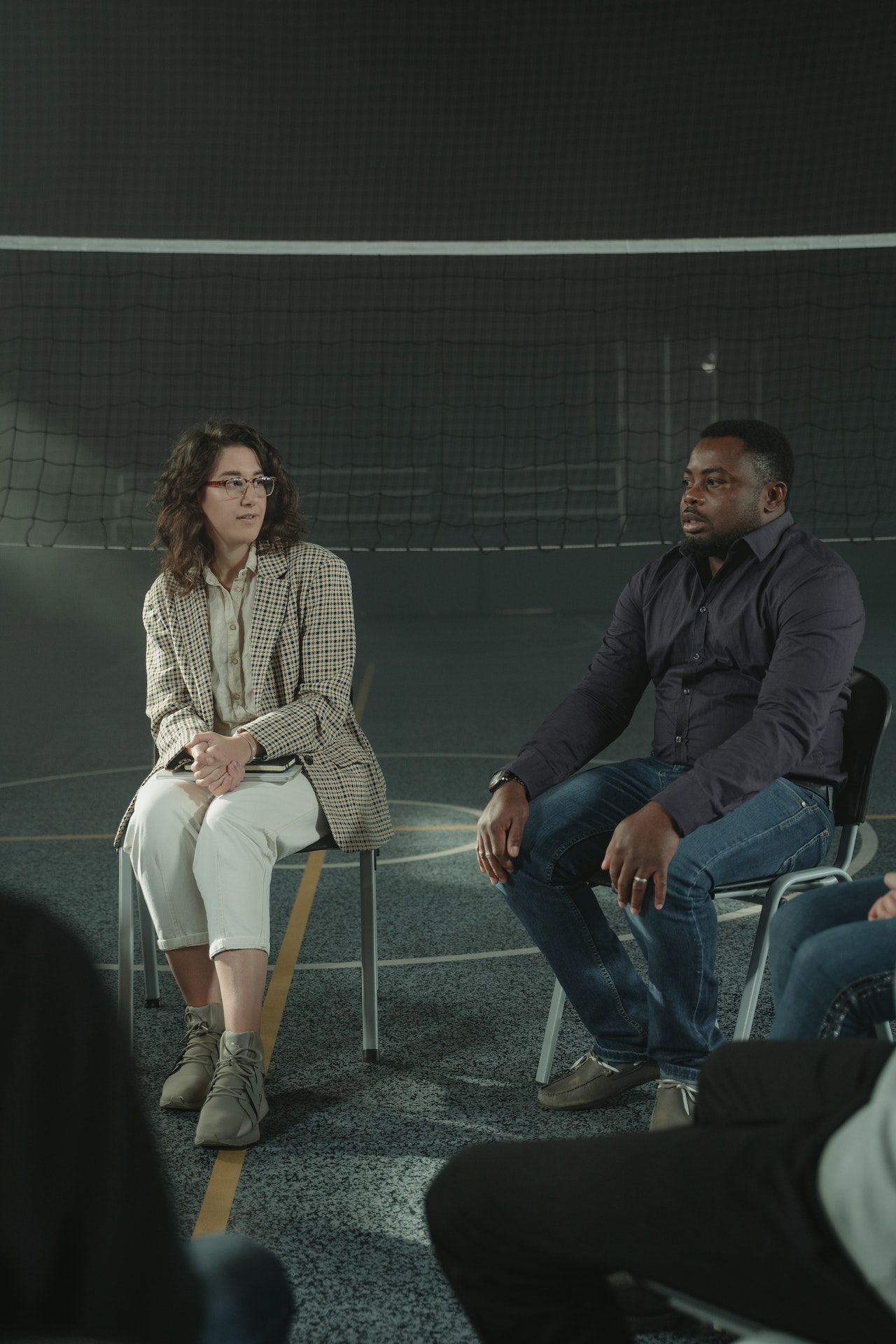
Cognitive behavioral therapy (CBT) is an evidence-based talking therapy that focuses on helping you change problematic behavior by reprogramming your thought patterns. It is an important part of our rehabilitation program and can be used to treat a wide range of mental health issues and alcohol and drug use problems.
At our cognitive behavioral therapy retreat, you’ll engage in regular CBT sessions led by fully qualified counselors who have extensive experience in using CBT to treat addiction behavior and mental health disorders. You’ll learn to think critically about challenging situations and develop a thorough understanding of how your thoughts and feelings influence your behavior.
Inpatient cognitive behavioral therapy is an active collaboration between patient and therapist. Give us a call today to learn more about treatment options or read on to find out how cognitive behavioral therapy can empower you to take control of your life.

Cognitive behavioural therapy is a mixture of cognitive therapy, which aims to change the way a person thinks about specific problems, and behaviour therapy, which aims to change a person’s problematic behaviour.
CBT encompasses both techniques by helping people understand the relationship between their thoughts and their feelings, and how those thoughts and feelings influence their behaviour. Through cognitive behavioural therapy, you can learn to identify cognitive distortions and reprogram the negative thoughts and beliefs that cause destructive behaviour.
Cognitive behavioural therapy is the most popular form of counselling in the world and is used both on its own and in combination with other therapeutic methods to treat a wide variety of issues. Our behavioral therapy CBT programme takes place over a series of sessions, during which our highly experienced counsellors will guide you through a structured plan as you learn to recognize the negative thought patterns surrounding your condition. You’ll learn how to process challenging thoughts and emotions, and develop the skills necessary to deal with difficult situations in a healthy and constructive way.
One of the key advantages of cognitive behavioural therapy is that it delivers results far more quickly than other forms of psychotherapy. By helping patients develop practical problem-solving skills, CBT is a short-term treatment method that delivers long-term results.

Cognitive behavioural therapy is based on the assumption that human behavior is learned and can therefore be unlearned or relearned. Through the use of empathetic conversation, CBT practitioners help patients recognise and change cognitive distortions – the irrational thought processes that contribute to many psychological issues.
In contrast to other forms of psychotherapy that encourage the patient to talk freely about whatever is on their mind, cognitive behavioural therapy sessions have a much more defined structure. This allows therapy time to be used more efficiently and ensures that the most important information is always discussed.
Behavioral therapy CBT requires more commitment than other types of talk therapy. For successful recovery, you must be prepared to be truthful with yourself and your therapist, spend time analysing your behaviour and feelings, and complete practical assignments in between sessions. While taking responsibility for your own learning and self-improvement can be challenging, it’s crucial for minimising the risk of relapse in the years ahead.
As you advance, you’ll take more and more responsibility for the content and direction of your behavioral cognitive therapy sessions. Taking a collaborative approach to cognitive therapy ensures you’ll feel empowered to continue working independently long after treatment finishes.
Here at Diamond Rehab, we understand the power of cognitive behavior therapy and the potential it has to induce significant, lasting change. Our tailored recovery plans emphasise the importance of cognitive therapy, whether it’s used as stand-alone treatment or in conjunction with detoxification, medication, wellness practices or other modalities.
Our cognitive behavioral therapy residential programs give you the opportunity to develop a wide range of practical tools and techniques that you can apply to your everyday life. The skills you learn will allow you to:
Therapists first began using cognitive therapy for depression about 50 years ago. While clinicians continue to use cognitive behavioral therapy for depression, the use of CBT has since been expanded to cover a wide range of disorders, including:
It is important to note that this is not an exhaustive list. While CBT is most commonly used to treat mental health conditions, just about anyone who wants to learn how to better manage stressful situations will benefit from CBT therapy.
CBT is a valuable tool for treating drug addiction. Whereas detoxification is useful for alleviating physical dependence and withdrawal symptoms, cognitive behavioral therapy for drug addiction focuses on addressing the underlying emotional and psychological factors that contribute to substance use disorders.
Cognitive behavioral therapy for addiction provides deep insight into the neuroscience of addiction behavior as you explore how automatic negative thoughts can lead to obsessions and compulsions with drug use. Under the expert guidance of our licensed therapists, you’ll learn how to recognize, process and respond to the personal triggers that cause drug cravings.
Nurturing healthy habits is critical for achieving long-term sobriety. We’ll help you develop the skills, emotional intelligence and confidence you need to live a fulfilling life free from the clutches of drug addiction.
The prospect of CBT therapy can be daunting, particularly if you’ve never engaged in any form of counselling. Rest assured, we provide a safe and comfortable space where you can be honest, transparent and vulnerable as you begin this important phase of the recovery journey.
During your first cognitive therapy session, your therapist will invite you to discuss specific concerns that you’d like to work on. We’ll ask you questions about your health, wellbeing and other aspects of your life to ensure we have a comprehensive understanding of the situation before we delve deeper into therapy.
There are no right or wrong answers here – this is simply a judgement-free conversation that gives us valuable insight into your goals and personal strengths, which will set the foundation for your recovery programme moving forward. Remember that behavioral cognitive therapy is a collaborative effort, so use this as an opportunity to ask your therapist about their approach to treatment, what to expect in the weeks ahead and what you can do outside of therapy sessions to support and accelerate the healing process.
The Diamond Rehab offers one of the best inpatient cognitive behavioral therapy programs in Thailand. From anxiety disorder cognitive behavioral therapy to cognitive behavioral therapy for opioid addiction and everything in between, we’ll provide you with the support, resources, and expert guidance you need to start developing healthier thinking habits.
Contact us today to learn more.
Everything you want know
If you are interested to come to The Diamond, please fill in the admission form and we will contact you ASAP. You can also call us on +66 (0) 98 721 85 87
At The Diamond Rehab Thailand we are experts in getting your loved ones into treatment. To start you can show your loved one our website and they will probably soon take an interest in our treatment center. If need be, we also can arrange an intervention at your home done by a professional interventionist arranged by The Diamond Rehab Thailand.
The process may differ, as programs are customised based on what the patient needs as well as the severity of the addiction or mental illness, but the goal of rehabilitation is always to ensure the individual’s well-being. Most treatment programs include: evaluation, detox or the clearing of alcohol and other drugs out of your system, psychological treatments, education sessions, and supportive services. When you transition into outpatient therapy, you may still have one-on-one or group therapy sessions and to some patients, these may last for the rest of their lives.
This depends on the situation. E.g. does the client need a detox? Is addiction the main problem or are the underlying issues more concerning? It is important that the client finish what he/she signed up for. Overall, we advise that 6 -8 weeks in treatment is average and gives the client a good foundation to start a new life at home with the proper aftercare.
At The Diamond Rehab Thailand, our clients get 3 group sessions per day, 4 one-to-one sessions per week, one one-one session per two weeks with the psychiatrist. Besides that, we offer a lot of sports, mindfulness, exercise, and outings.

Schedule free assessment
Concerned about yourself or your loved one?
Schedule a free assessment with our experts.